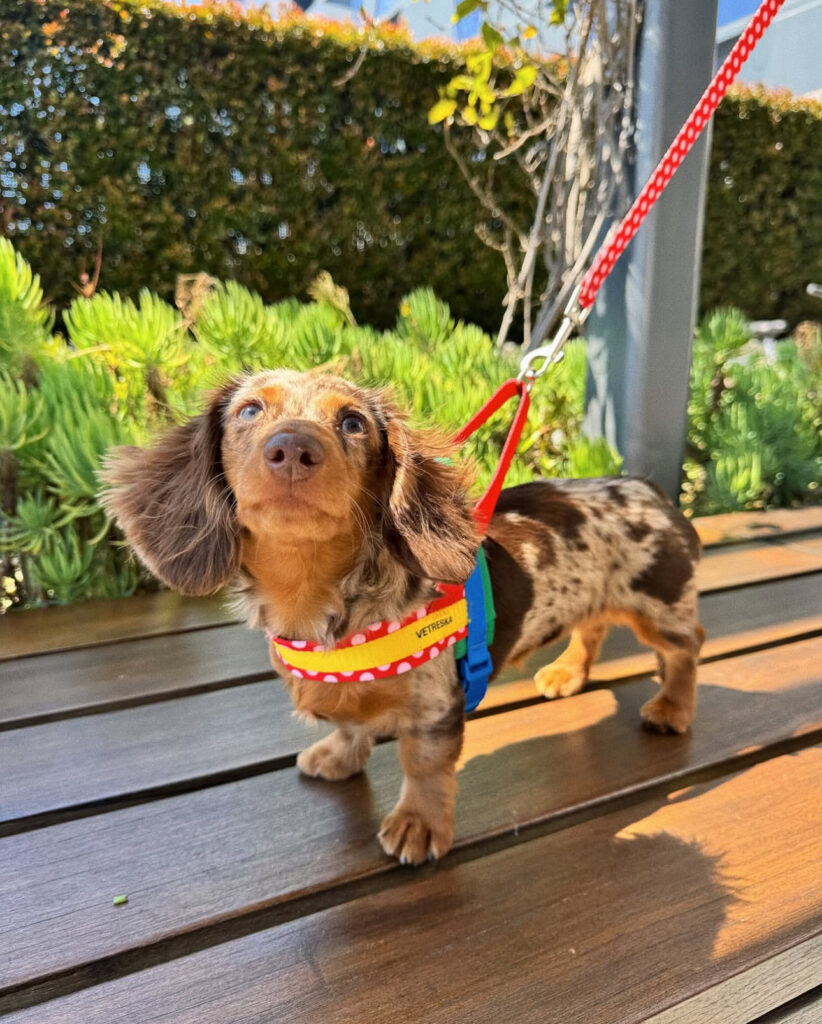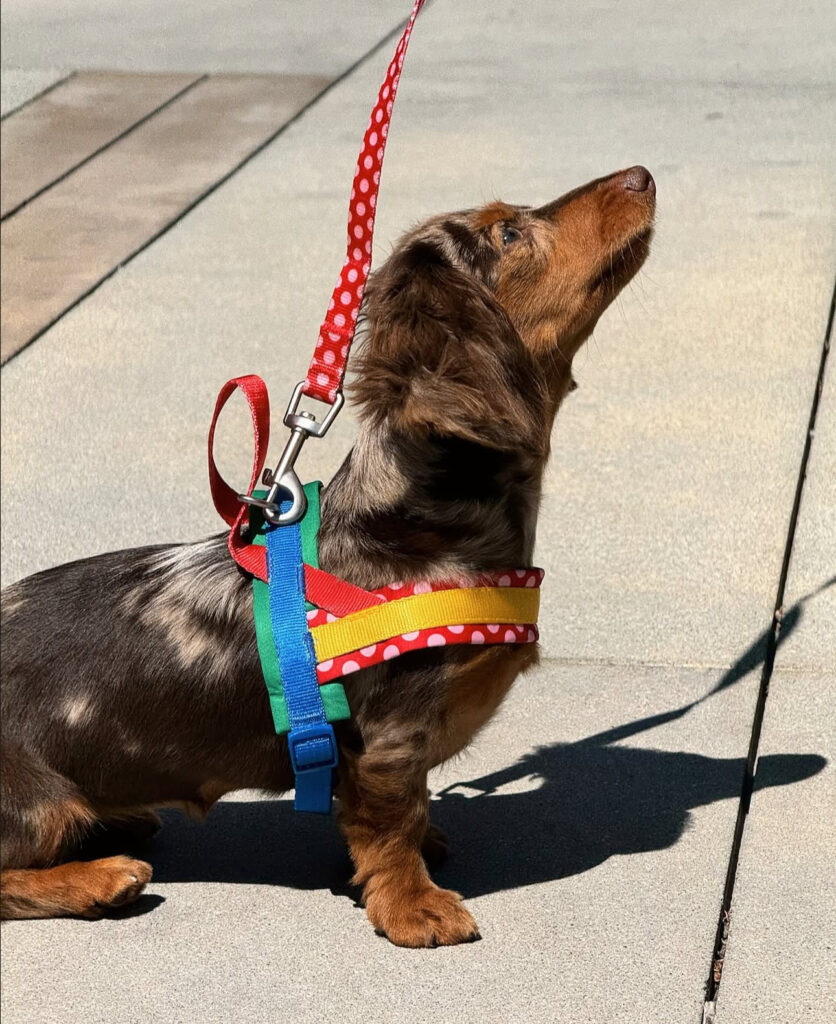Mini Dachshund Puppy Training Tips – From a Breeder Who’s Raised Hundreds
Hi there! If you’re reading this, chances are you’re either bringing home a mini dachshund puppy or thinking about it. And as someone who’s been raising these spunky little pups right here in California for years, let me tell you—early training is everything.
Mini dachshunds are clever, loving, and totally devoted to their people. But they’re also famously stubborn. With the right training plan in place early on, though, your pup can grow into a well-behaved, confident little companion.
Let’s dive into the training tips I give to all my buyers—plus a few breeder secrets I’ve picked up over time.
Why Early Training Makes a Huge Difference
Mini dachshund puppies are naturally curious and quick learners. But they can also become barky, anxious, or territorial if not shown the right path early on.
That’s why in my breeding program, training starts as early as 3 to 4 weeks old. I introduce crate basics, handling routines, and even simple commands like “sit” using treats and repetition. By the time they go home at 8–10 weeks, they’ve already got a strong foundation.
A pup named Penny stands out in my memory—her new family said she slept in her crate the very first night with zero fuss. Why? Because she was already used to it from day one here.
H2: My Top Mini Dachshund Puppy Training Tips
H3: Set a Daily Routine Early
Dachshund puppies thrive on structure. Here’s a simple starter routine:
- 7 AM: Potty, breakfast, short play
- 9 AM: Nap in crate
- 12 PM: Potty, lunch, training time
- 3 PM: Walk or supervised outdoor time
- 6 PM: Dinner
- 8 PM: Quiet play, potty, bedtime
Puppies feel more secure when they know what’s coming next.
H3: Positive Reinforcement Only, Please
This breed responds best to rewards—not scolding. I recommend using:
- Tiny soft treats (think: Zuke’s or freeze-dried liver)
- Happy verbal praise (“Good girl!” goes a long way)
- Playtime rewards
Avoid yelling or leash pops. It just confuses and scares them. You’ll see way more progress using kindness and consistency.
H3: Keep Training Sessions Short and Sweet
At 8–12 weeks old, your puppy’s attention span is about as long as a goldfish’s. 😅 Stick to 5–10 minute training bursts, 2–3 times a day.
Work on one skill at a time—sit, stay, come, etc.—and always end on a high note.

H2: Crate Training Basics From My Home to Yours
I crate train all my pups from a young age, and I encourage all new owners to continue it. Here’s what works:
- Make the crate cozy: add a blanket and a safe chew toy.
- Keep it near you at night.
- Never use the crate as punishment.
- Use a consistent cue like “kennel up” when guiding them in.
One of my recent litters had a pup named Benny who would run to his crate the second he got tired. It was his safe place—and that’s the goal.
H2: Potty Training – The Breeder’s Formula
I always tell new puppy owners: potty training success = consistency + supervision.
What Works:
- Take your pup out right after meals, naps, and play.
- Use the same potty spot and verbal cue (like “go potty!”).
- Celebrate big when they go outside.
What to Avoid:
- Rubbing noses in accidents (please don’t).
- Yelling.
- Giving too much freedom too soon.
Keep your pup confined or in a small area until they’ve earned full access to the house.
H2: Must-Have Mini Dachshund Puppy Training Tips tools
These are items I include in my buyer recommendations and sometimes even in new puppy kits:
- Crate (22″ or 24″ works well)
- Clicker (if you plan to use clicker training)
- Training treats (soft, low-calorie)
- Harness and leash (avoid collars early on)
- Pee pads (only if absolutely necessary indoors)
I can also recommend trusted brands and shopping links based on what your pup was raised on.
H2: Mistakes I See New Puppy Owners Make
We’ve all been there—but if you can avoid these, you’ll save yourself a lot of headaches:
- Changing routines constantly
- Caving to barking for attention
- Giving free roam too early
- Punishing fearful behavior
If your puppy seems stubborn, try stepping back. Ask yourself: am I being clear, calm, and consistent?
H2: Socialization Is Part of Training Too
Socializing your mini dachshund puppy is just as important as teaching commands.
I start this here in my home with:
- Kids
- Gentle adult dogs
- Household sounds
- Car rides
- Light grooming
Once your pup comes home:
- Expose them to visitors, kids, and new surfaces.
- Enroll in a puppy kindergarten class.
- Keep outings short and positive.
H2: Need Help? I’ve Got You Covered
Sometimes, owners need extra support—and that’s okay!
Here’s what I offer:
- Ongoing support after adoption or sale
- Pre-trained puppies (crate + basic commands started)
- Direct links to the training gear I use

H2: Ready for a Trained or Training-Started Puppy?
At my California-based breeding program, I don’t just send you home with a puppy—I send you home with a plan.
Each mini dachshund I raise receives:
- Early crate and potty training
- Daily socialization
- Personalized feeding and care guide
- USDA-compliant, pet-safe shipping methods with tracking and updates. For out state buyers.
👉 Check out my online pet shop to view available puppies and upcoming litters. I also offer phone consultations to help you choose the right fit for your lifestyle.
Final Thoughts
Training a mini dachshund puppy takes time, but with the right guidance, it can be a smooth and incredibly rewarding experience. These little dogs are full of heart, and once you earn their trust, they’ll do anything for you.
Start early, stay consistent, and remember—you’ve got a breeder (me!) in your corner.
